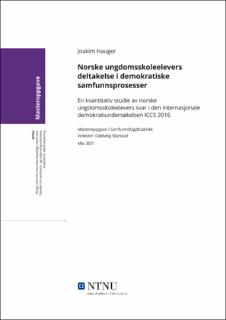| dc.contributor.advisor | Storstad, Oddveig | |
| dc.contributor.author | Hauger, Joakim | |
| dc.date.accessioned | 2021-09-28T17:51:50Z | |
| dc.date.available | 2021-09-28T17:51:50Z | |
| dc.date.issued | 2021 | |
| dc.identifier | no.ntnu:inspera:76470112:23315491 | |
| dc.identifier.uri | https://hdl.handle.net/11250/2785128 | |
| dc.description.abstract | Denne studien undersøker forhold ved norsk ungdoms demokratideltakelse gjennom en statistisk analyse av de norske elevenes svar på et spørreskjema fra ICCS 2016 elevundersøkelsen. Dette skjer ved en kvantitativ tilnærming hvor datamaterialet fra spørreundersøkelsen analyseres med det statistiske dataprogrammet SPSS. De norske elevenes svar på det internasjonale spørreskjemaet i ICCS 2016 utgjør altså denne oppgavens datamateriale, som dermed legger føringer for prosjektets innhold. De ulike forholdene ved norske ungdommers demokratideltakelse utforskes ved ta utgangspunkt i fire forskningsspørsmål utformet fra problemstillingen «Hvilke former for demokratisk deltakelse finner vi blant norske 9. klassinger, hvilke faktorer er med å påvirke deltakelsen, og hvilke implikasjoner kan dette ha for demokratiopplæringen?»:
• Hvilke former for demokratideltakelse finner vi blant norsk ungdom?
• Hvilken grad av demokratideltakelse finner vi blant norsk ungdom?
• Hvilke faktorer påvirker den demokratiske deltakelsen til norsk ungdom?
• Hvilke konsekvenser kan funnene ha for demokratiopplæringen i skolen?
De tre første forskningsspørsmålene tar utgangspunkt i univariate-, bivariate- og regresjonsanalyser fra oppgavens datamateriale og knyttes opp mot teori og tidligere forskning. Det siste forskningsspørsmålet tar i stor grad utgangspunkt i funn fra oppgavens drøftingsdel og diskuterer ulike implikasjoner resultatene kan ha for demokratiopplæringen i skolen. Prosjektet studerer i hovedsak to ulike former for demokratideltakelse blant ungdommen. I og med at enhetene i dette spørreskjemaet er under stemmerettsalderen vil ikke deltakelse ved valg være i fokus, men oppgaven er heller fokusert rundt ungdommens deltakelse i organisasjoner og deliberative deltakelse. Disse to deltakelsesformene operasjonaliseres i oppgavens metodedel og utgjør oppgavens avhengige faktorer. Oppgavens uavhengige faktorer, som brukes til å undersøke hva som påvirker deltakelsen er kjønn, politisk interesse, tillit til institusjoner, opplevd rom for åpne klasseromsdiskusjoner, demokratikunnskaper og foreldres høyeste utdanning.
Det mest sentrale funnet i oppgaven er at påvirkningsforholdet mellom politisk interesse og deliberativ deltakelse virker å være relativt sterkt, og er den klart sterkeste statistiske sammenhengen denne oppgaven kan vise til. På den andre siden fremvises det en negativ påvirkningskraft mellom elevenes demokratiske kunnskaper, og deres demokratiske deltakelse, både for deltakelse i organisasjoner og deliberativ deltakelse. I Oppgaven vurderes det derfor til at i den grad demokratiopplæringens formål er å utvikle elevene til mer engasjerte og deltakende medborgere, bør det fokuseres mer på aktiviteter som øker elevers politiske interesse, og mindre på kunnskaper om demokratiets oppbygning. Likevel anerkjennes det at kunnskaper om demokratiet også er en viktig del av opplæringen. | |
| dc.description.abstract | This study examines various aspects of Norwegian youth's participation in democracy, through a statistical analysis of the Norwegian students' answers from the international student questionnaire version of The ICCS 2016 survey. This is done by a quantitative approach where the data material from the survey is analyzed with the help of the statistical computer program SPSS. The Norwegian students' answers to the international questionnaire in ICCS 2016 therefore provides the guidelines for the content of this project. The thesis statement of this study is «What kind of democratic participation do we find among Norwegian 9th graders, what factors influence this participation, and what are the implications of this on the democracy education? », which makes the base for the four research questions:
• What forms of democracy participation do we find among Norwegian youth?
• What degree of democracy participation do we find among Norwegian youth?
• What factors influence the democratic participation of Norwegian youth?
• What consequences can the findings have for democracy education in schools?
The first three research questions are based on univariate, bivariate and regression analyzes from the thesis' data material. The fourth research question is largely based on findings from the discussion part of the thesis, and debates various implications the results may have for democratic education in schools. The project mainly studies two different forms of democracy participation among young people. As the units in this questionnaire are below the voting age, participation in elections will not be in focus, but the task is rather focused on young people's participation in organizations and their deliberative participation. These two forms of participation are operationalized in the method part of the thesis and constitute the thesis' dependent factors.
The independent factors of the thesis, which are used to examine what influences participation, are gender, political interest, trust in institutions, perceived space for open classroom discussions, knowledge of democracy and parents' highest education.
The most central finding in the thesis is that the influence between political interest and deliberative participation seems to be relatively strong and is the statistically strongest connection this thesis can point to. On the other hand, a negative influence is shown between the students' democratic knowledge and their democratic participation. This applies both for participation in organizations and deliberative participation. The thesis therefore considers that, to the extent that the purpose of democracy education is to develop students into more engaged and participating citizens, it should focus more on activities that increase students' political interest and less on knowledge about the structure of democracy. Nevertheless, it is recognized that knowledge of democracy is also an important part of the education. | |
| dc.language | nob | |
| dc.publisher | NTNU | |
| dc.title | Norske ungdomsskoleelevers deltakelse i demokratiske samfunnsprosesser | |
| dc.type | Master thesis | |
